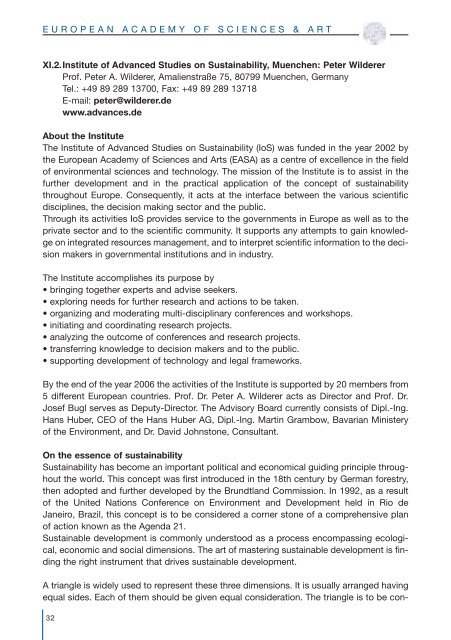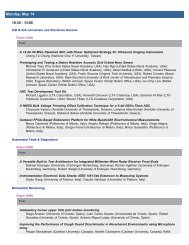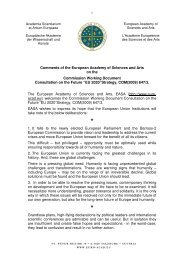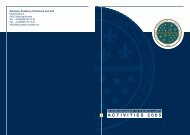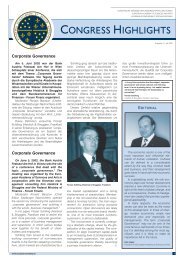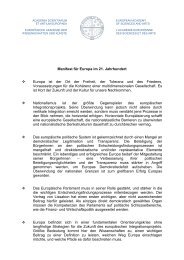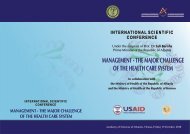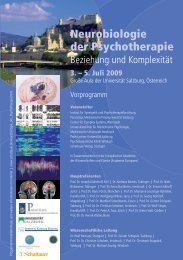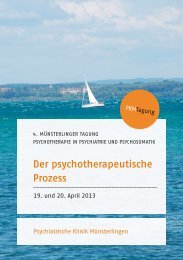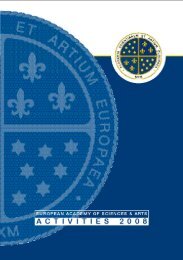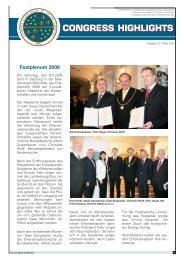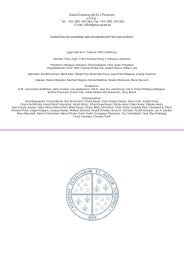Activities 2006 - European Academy of Sciences and Arts
Activities 2006 - European Academy of Sciences and Arts
Activities 2006 - European Academy of Sciences and Arts
Sie wollen auch ein ePaper? Erhöhen Sie die Reichweite Ihrer Titel.
YUMPU macht aus Druck-PDFs automatisch weboptimierte ePaper, die Google liebt.
EUROPEAN ACADEMY OF SCIENCES & ART<br />
XI.2.Institute <strong>of</strong> Advanced Studies on Sustainability, Muenchen: Peter Wilderer<br />
Pr<strong>of</strong>. Peter A. Wilderer, Amalienstraße 75, 80799 Muenchen, Germany<br />
Tel.: +49 89 289 13700, Fax: +49 89 289 13718<br />
E-mail: peter@wilderer.de<br />
www.advances.de<br />
About the Institute<br />
The Institute <strong>of</strong> Advanced Studies on Sustainability (IoS) was funded in the year 2002 by<br />
the <strong>European</strong> <strong>Academy</strong> <strong>of</strong> <strong>Sciences</strong> <strong>and</strong> <strong>Arts</strong> (EASA) as a centre <strong>of</strong> excellence in the field<br />
<strong>of</strong> environmental sciences <strong>and</strong> technology. The mission <strong>of</strong> the Institute is to assist in the<br />
further development <strong>and</strong> in the practical application <strong>of</strong> the concept <strong>of</strong> sustainability<br />
throughout Europe. Consequently, it acts at the interface between the various scientific<br />
disciplines, the decision making sector <strong>and</strong> the public.<br />
Through its activities IoS provides service to the governments in Europe as well as to the<br />
private sector <strong>and</strong> to the scientific community. It supports any attempts to gain knowledge<br />
on integrated resources management, <strong>and</strong> to interpret scientific information to the decision<br />
makers in governmental institutions <strong>and</strong> in industry.<br />
The Institute accomplishes its purpose by<br />
• bringing together experts <strong>and</strong> advise seekers.<br />
• exploring needs for further research <strong>and</strong> actions to be taken.<br />
• organizing <strong>and</strong> moderating multi-disciplinary conferences <strong>and</strong> workshops.<br />
• initiating <strong>and</strong> coordinating research projects.<br />
• analyzing the outcome <strong>of</strong> conferences <strong>and</strong> research projects.<br />
• transferring knowledge to decision makers <strong>and</strong> to the public.<br />
• supporting development <strong>of</strong> technology <strong>and</strong> legal frameworks.<br />
By the end <strong>of</strong> the year <strong>2006</strong> the activities <strong>of</strong> the Institute is supported by 20 members from<br />
5 different <strong>European</strong> countries. Pr<strong>of</strong>. Dr. Peter A. Wilderer acts as Director <strong>and</strong> Pr<strong>of</strong>. Dr.<br />
Josef Bugl serves as Deputy-Director. The Advisory Board currently consists <strong>of</strong> Dipl.-Ing.<br />
Hans Huber, CEO <strong>of</strong> the Hans Huber AG, Dipl.-Ing. Martin Grambow, Bavarian Ministery<br />
<strong>of</strong> the Environment, <strong>and</strong> Dr. David Johnstone, Consultant.<br />
On the essence <strong>of</strong> sustainability<br />
Sustainability has become an important political <strong>and</strong> economical guiding principle throughout<br />
the world. This concept was first introduced in the 18th century by German forestry,<br />
then adopted <strong>and</strong> further developed by the Brundtl<strong>and</strong> Commission. In 1992, as a result<br />
<strong>of</strong> the United Nations Conference on Environment <strong>and</strong> Development held in Rio de<br />
Janeiro, Brazil, this concept is to be considered a corner stone <strong>of</strong> a comprehensive plan<br />
<strong>of</strong> action known as the Agenda 21.<br />
Sustainable development is commonly understood as a process encompassing ecological,<br />
economic <strong>and</strong> social dimensions. The art <strong>of</strong> mastering sustainable development is finding<br />
the right instrument that drives sustainable development.<br />
A triangle is widely used to represent these three dimensions. It is usually arranged having<br />
equal sides. Each <strong>of</strong> them should be given equal consideration. The triangle is to be con-<br />
32


